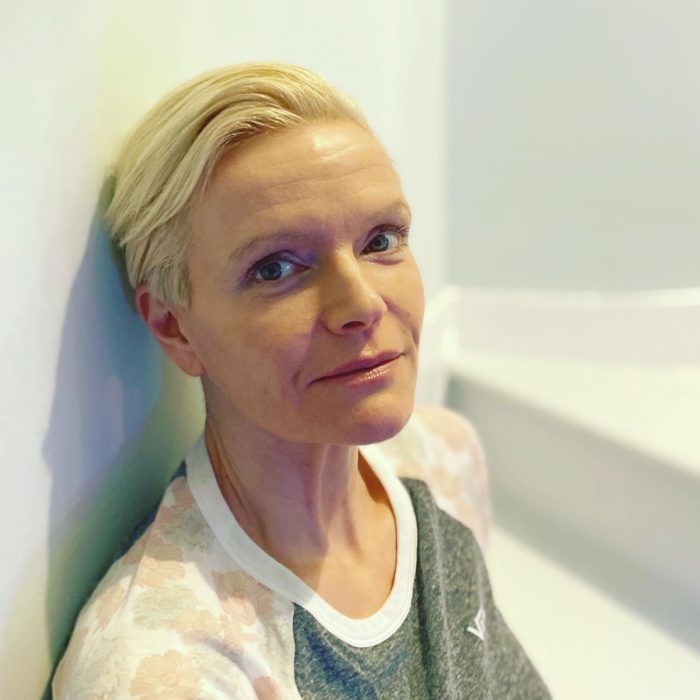The haunting British film Martyrs Lane had its world premiere at Fantasia International Film Festival recently and I had the pleasure of a conversation with director/screenwriter Ruth Platt. Ruth’s career until recent years was in front of the camera as a television actor, and I asked what it had been like to transition to the role of director.
“I loved acting,” said Ruth. “I loved the work, the collaboration; but what I didn’t love was having to do jobs for money that you didn’t want to do. And there were some toxic elements to the industry which are thankfully getting better now, but I did experience some myself in a ‘me too’ kind of way. I was also keen to get out on my own and be a creator because if you’re doing a piece of work, it’s the most wonderful thing; but if it’s not as good, well it made me want to write and create. Now I’m much more comfortable being behind the camera.”
“It’s a tough environment being an actor, and you go to a casting and there’s literally—like in GLOW, there’s an audition where there are forty women who look like her in a room. It’s a brutal business. If you’re well connected or you’re incredibly confident and you strike that one audition, which can happen, but it’s rare: it’s a tough industry and I love creating. Not because I think I can do it better than anyone else, but I want to make the stuff that I think I can make. You have to believe in yourself though.”
Now, despite the tough nature of the film industry, hasn’t Ruth started a couple of young girls down that path? I asked Ruth her approach to protecting Kiera Thompson and Sienna Sayer, the stars of Martyrs Lane. “I did try to be as protective as I could,” answered Ruth. “Not exploiting them and not making them feel uncomfortable was very important to me. But I mean that’s how I would hope I’d always work with actors, but especially with the children, I was really keen to just make them feel no pressure, and make it like a game. Even though it was quite dark material, only when you feel at ease and you’re playing can you create your most spontaneous work. So I wasn’t trying to push the whole story arc on them, I was trying to keep them in the moment, keep them spontaneous, rather than applying any pressure of performance. I don’t think the environment has to be toxic, but it often has been.”
Ruth both wrote and directed Martyrs Lane, as well as a couple of others including another genre film, The Lesson. I asked her how she decides which point of view to write the story from. “It was always going to be the child’s point of view in this film,” Ruth answered, “because it started with the concept of a child trying to work out what has gone wrong in the family she’s been born into, and not being privy to information, not being told stuff. I guess that’s a little bit autobiographical: the story isn’t autobiographical, but there is a little seed there from my own development. My siblings were older, my parents were older, and I was kind of rattling around this old vicarage trying to work out stuff and overhear stuff. But choosing the point of view is interesting. In this one, it was central to the whole inception of the story, but in The Lesson, it’s mostly Finn, the teenage boy and it does veer between him and the bad guy.”

I read a quotation from Orson Welles recently: “If you want a happy ending, that depends, of course, on where you stop your story.” Martyrs Lane could have ended at one of several points and I asked Ruth how she decides at what point to stop the story. “I think for me the structure, emotional and psychological structure, was quite formed in my head from the beginning. So the idea that if you dig and dig and dig as a child into something that you shouldn’t, and has been suppressed by adults, it can go either way; a cathartic moment of connection or (if you’re not able to cope with that) it can go somewhere more destructive. So it was looking at what happens if you dig at the truth and where that truth takes you, I guess. That provided the endpoint of the movie. Hopefully, it holds two truths up that it can either take you to a good place or to a bad place: that’s your choice.”
One aspect of the film I wasn’t quite comfortable with was the relationship between Leah’s parents. It felt like a husband dismissing a wife who he felt was neurotic a good deal of the time (though subtly enough that it might not have been seen that way by those without similar experiences). I asked Ruth what was her intention in that dynamic. “I didn’t see her as neurotic at all,” answered Ruth, “though possibly the husband did. I think he tried very hard not to, but you know, they’ve dealt with their issue in different ways. And because you see everything from the child’s point of view, you’re only picking up hints of how they see each other, how they cope with each other. I think she has had to suppress so much to function and act ‘normally’ because there’s a real pressure to act ‘normally,’ that whatever is unraveling right now is coming through in little bursts of exchange. Whereas he is very much geared to keeping everything stable. So I don’t think he patronizes her, I think he is afraid of deep emotion and I think he tries to skirt around that. I worry if you think he saw her as neurotic: it wasn’t what I intended.”
Having seen both Martyrs Lane and The Lesson, it seemed to me that a common thread was the contrast between adult and child perspectives (what I read about Ruth’s other film, The Black Forest, tied in with this observation too). I asked whether that was intentional. “I think it is,” said Ruth. “It’s something I’ve observed and you have to write what you know. It was very much part of my childhood, and part of my life as an adult as well. I came out of the industry to have my kids and I spent a long time unemployed basically, during which time I observed my own children grow up (they’re young teenagers now). What I’ve seen very closely and in detail are different perspectives, from my own memory and from watching my children; their interaction with other children as well as with other adults. It’s definitely something I’m interested in, within an educational setting, family setting. You’re right: it’s definitely a theme running through three quite different films.” I had found the older sister, Bex (Hannah Rae), quite interesting, as she had such a complex bond with young Leah: it would be interesting to see the story from her angle.
Now, shortly after the Fantasia premiere came the announcement that Martyrs Lane had been picked up by Shudder. I asked Ruth how she felt about that. “Really, really excited. As I said earlier I felt like an outsider in the industry for a long time and it feels like the door has opened a little bit and I’ve got my shoe in there. It’s lovely, a lovely feeling to have that acknowledgment. Fantasia has been so wonderful too, and passionate about the film. To know that it’s going to get onto a platform like Shudder and be seen by a big audience is really exciting.”
And what’s next for Ruth Platt? “I’m writing another genre story, which actually probably does have generational insights again,” answered Ruth. “I’m feeling quite inside the genre now, I think I understand it more and know how to work it, how to play it. So I’m quite excited about that. I’m just writing and hopefully making another film at some point soon.”
Martyrs Lane will be coming to Shudder on 9 September 2021.


